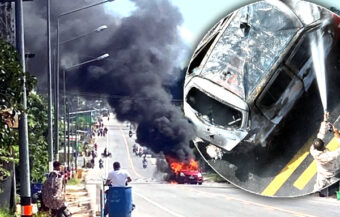The surprise election result has raised the stakes in Thai politics as the public has voted for a party that wants to see political accountability and real democracy. This week, Mr Jatuporn predicted that Pheu Thai may turn if, as he thinks likely, Mr Pita’s efforts at forming a government fail in parliament with embedded opposition from the unelected Thai Senate which was appointed after the 2019 General Election with 194 members hand-picked by the outgoing junta in its last days.
Despite rapid moves this week from the victorious Move Forward Party to put together a new coalition government, there are strong and mounting fears that Thailand may be heading towards a political impasse leading up to an August vote to elect a new prime minister and government. In court again this week facing charges, a veteran of the country’s ruinous street protests and the colour-coded struggle over the last eighteen years, former United Front for Democracy against Dictatorship (UDD) Chairman Jatuporn Prompan told reporters that he thought the chances of Mr Pita getting the support he needed from the Thai Senate were very marginal and warned that the Pheu Thai Party may turn away from the current efforts, something that would be a step backwards for democracy in the country. Mr Jatuporn appeared to suggest, instead, that the pro-democracy coalition should wait it out until June 2024 when the Thai Senate’s voting rights will expire by law under Section 272 of the Thai Constitution.

It is not even a week since the result of the May 14th election which stunned Thailand with an emphatic win for the Move Forward Party but there are clear signs that the kingdom is moving towards a political impasse or stalemate which could turn out to be even more serious than past political disturbances if cooler and more strategic heads do not prevail.
On Wednesday, the Move Forward Party leader Mr Pita Limjaroenrat announced a plan to publish a roadmap on May 22nd which should give some idea of what the programme for a new coalition government, now with eight parties controlling 313 seats, will pursue if it comes to power.
Indications conservative parties plan to block the Move Forward Party over its position on Article 112 or the lèse-majesté law and turn Pheu Thai
However, despite the tight-lipped stance from the military-aligned parties led by the 2014 coup leaders, General Prayut Chan ocha, the current Prime Minister and Deputy Prime Minister Prawit Wongsuwan, there are indications that the establishment parties and their allies are planning to block the new government by using the power of the Senate.
The pretext for this is the party’s position on the draconian lèse-majesté law which is being used by conservatives to question its publicly stated commitment to the Monarchy.
Many foreign observers outside Thailand find it difficult to understand what is happening in the kingdom due to the complex and byzantine nature of the 2017 Constitution which was explicitly designed by a junta-appointed drafting committee to create a political structure in Thailand which weakened the power of elected politicians under the pretext of preventing corruption or undue influence by any one person or business interest in the affairs of the nation.
The Move Forward Party’s resounding win and ambitions were referred to by the veteran street protester and former leader of the United Front for Democracy against Dictatorship (UDD) this week Mr Jatuporn Prompan while speaking to reporters in court and still facing charges over unrest as far back as 2007 and 2008.
Jatuporn says he’s very doubtful about Pita’s chances of bringing his new coalition government with over 60% of the lower house seats, to power as PM
He said that he thinks the chances of Mr Pita being allowed to form his government are nil. This comes despite the proposed coalition already controlling over 62% of the House of Representatives.
He suggested, as the pro-junta parties are anticipating, that the populist Pheu Thai Party which came in second place will ultimately, over the next few months before August, turn away from its alliance with the Move Forward Party to avoid the rising prospect of serious political conflict or instability.
‘When the social trend chooses a far-reaching party, in the first round, every party must play a protagonist role, that is, support the progressive party to elect Mr Pita as prime minister. But later on, he will definitely not be able to deliver on his promise to form a government. There will then be a turn-away party. And that party has already prepared a turn. Just wait until the end of the two-month time frame,’ Mr Jatuporn said.
Thaksin this week appeared to give his wholehearted support to the Move Forward Party although he also underlined his family’s support for the Monarchy
This was not how Mr Thaksin Shinawatra saw it earlier in the week just after the election when he welcomed the Move Forward Party win while the Pheu Thai Party leader Mr Cholnan Srikaew has promised that his party is presently committed to a new government of ‘hope and dreams’ and even argued the controversial proposals by Move Forward to alter Article 112 of the Criminal Code on lèse-majesté should not be a problem.
‘Article 112 isn’t an issue that will prevent us from working together, because there are common agreements that everyone sees as a solution,’ he said after this week’s press conference in central Bangkok on Wednesday.
However political analysts are a bit more cynical.
‘Due to the number of seats that Pheu Thai holds, any viable coalition must include it in the political equation,’ explained Napon Jatusripitak, of the ISEAS-Yusof Ishak Institute in Singapore this week. ‘The same cannot be said for the Move Forward Party.’
Rising danger as the stakes have got higher. This is no longer about populism and cash giveaways, the battleground now is political accountability
The danger of the current situation is that this election victory did not come about as a result of populist policies as we had seen before from Pheu Thai-led efforts to win elections which followed a pattern over the last two decades where the rural poor elected the party to disperse some of the country’s wealth and largesse, something that was opposed by the urban elite.
This election result has thrown up a far more informed Thai electorate who are reacting indirectly to the claustrophobic provisions and political environment created by the restrictive 2017 Constitution.
They are demanding reform both economically in terms of a welfare state and politically by suggesting that ultimately, power in the country resides with the people.
This is vigorously opposed by the conservative elite in the kingdom who see Thai cultural traditions, its religion and the monarchy as the ultimate unifier and glue that hold the kingdom together and that extra powers, aside from the ballot box, are required to preserve this order.
All eyes on the Thai Senate who until 2024 have the power, if they choose to use it, to mould the election result and democratic will of the people
During the week a revolving door of senators came out to make pronouncements, some saying that they would oppose Mr Pita and the Move Forward Party while others suggested that the will of the people expressed by the lower house or House of Representatives had to be respected.
The new proposed coalition needs at least 50 senate votes if it is to progress even if the Move Forward Party manages to come to an accommodating formula to neutralise its position on Article 112 and this allows it to obtain the support of the Democrat Party with its 25 seats.
Some analysts point to a vote by the Senate in recent times to axe its say in electing the Prime Minister which expires anyhow in June 2024, when 64 senators voted in favour of such a move.
194 members of the Senate were appointed by the outgoing junta in 2019 in its last days while the other members are senior officials and key representatives of society.
One former political advisor, this week, Mr Paisarn Phuechmongkol, said he thought that up to 75 senators may ultimately support Mr Pita if he decided to compromise on his party’s manifesto regarding Article 112, something that already firebrands within Move Forward are warning about.
One estimate is that only 20 senators will support Pita even with the lèse-majesté reform plan sidelined
However, another analyst, at the same time, suggested that only 20 senators may ultimately support Mr Pita even if he sidelines his party’s policy on the lèse-majesté provision with reports that Prime Minister Prayut Chan ocha controls over 120 senators with Deputy Prime Minister Prawit Wongsuwan directly influencing 80 upper house members.
In addition, the Election Commission may well use the complaint filed against Mr Pita Limjaroenrat on Tuesday over shares in a defunct media firm to move against him as it did in 2019 in respect of Future Forward Party leader Thanathorn Juangroongruangkit.
The power given to this body under the 2017 Constitution is extraordinary and supported by the country’s political law and a raft of supporting legislation which creates a minefield for political representatives which can be used to undermine or trip up political usurpers by the establishment which everyone knows exists in Thailand and which was referred to before the onset of the General Election campaign by Deputy Prime Minister Prawit Wongsuwan who during the campaign repeatedly pushed himself as peacemaker between the two factions in Thailand.
Deputy Prime Minister Prawit Wongsuwan has talked about bridging a divide in Thailand and even raised the question of the country’s history of coups
He warned that those who considered coup d’états beneficial still existed within the country’s power structure.
Deputy Prime Minister Prawit Wongsuwan warns that those in power who support coups still exist
The problem for them, however, may be that decades of thwarting the political will of the masses have now produced a more informed and politically aware electorate who changed the rules of the game last Sunday.
The new political divide in Thailand will not be a cultural struggle between those wanting cash or populist policies but an increasingly organised and educated electorate who want to see structural change and reform in Thailand in both the economic and political spheres.
A key factor in this equation ultimately is Section 272 of the 2017 Constitution which says that the power of the predominantly junta-appointed Senate expires after June 2024.
Earlier in the week, while in court, Mr Jatuporn suggested that the pro-democracy parties should just wait it out until then before voting on a democratic government reflecting the will of the people in the election.
Join the Thai News forum, follow Thai Examiner on Facebook here
Receive all our stories as they come out on Telegram here
Follow Thai Examiner here
Further reading:
Election vote for Move Forward may have been a cry for help from voters mired in short-term debt
Pita, Move Forward and eight other parties meet in Bangkok and come out smiling, ready to govern
Move Forward Party’s good election result leaves uncertainty as to who will form the government
Move Forward leader denies claims he held shares in media company barring him as a Bangkok MP
Move Forward Party surging in the polls as the General Election campaign enters its final week
PM warns giveaway policies of some parties may be ‘bad karma’ for the country in the longer run
Leader of PM’s UTN tells rally a government led by his party will ‘get tough’ with nation haters
Deputy Prime Minister Prawit Wongsuwan warns that those in power who support coups still exist
Former ministers rejoin the Palang Pracharat Party but there is no new economics czar Somkid
Ung Ing says Prawit is better liked than PM Prayut with reports of the return of key ex-ministers


















